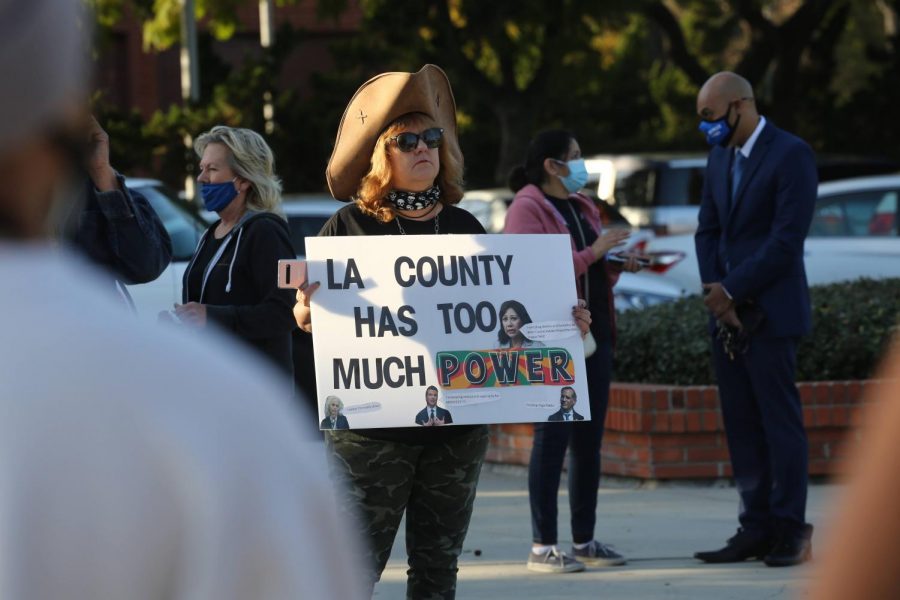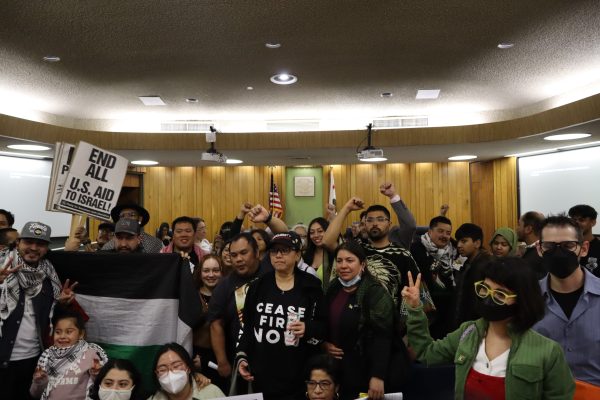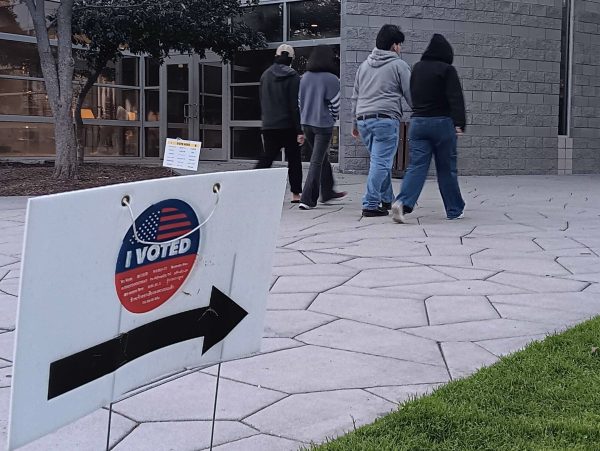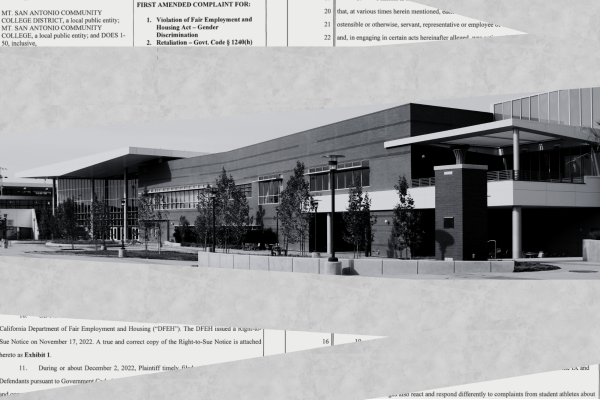City’s “Unnecessary Duplication Of Services” Requires New State Process
Aside from looming citywide issues, state officials tell West Covina residents there’s no process to approve a new local health department
Sarah Beth McHargue Love protests at the Change West Covina press conference outside of the West Covina City Hall on March 16, 2021. Photo credit: Abraham Navarro/SAC.Media.
Despite divided opinions on the proposal of a new health department, Supervisor Hilda Solis and County Health Officer Muntu Davis have reassured residents of their support for the city.
Davis even repeated that the city’s decision will change nothing until the city’s health department is recognized by the state.
It appears, however, that the city might be relying on the county for longer than it intended to.
At a second town hall on April 1, former State Health Officer Ron Chapman said there is no process for this break from the county.
“This process presently does not exist, and as far as we can tell, has not happened in over a century– the approval of a city public health department”
“I assume that the approval process would be all encompassing and would need to include a solid financial foundation,” Chapman said.
State Chief Counsel Deputy Hugh “Drew” Brereton agreed with Chapman that this would not be a quick process and that it must be done right. Specifics on the new process were not discussed.
Aside from no process, the city has to fully commit if it intends to go forward.
The city of Vernon, which is cited as an “environmental health department” only does its own environmental reviews and does not act as a “health department.” It has no health officer.
This means Vernon is not recognized by the state because the county performs its main duties. West Covina will likely be in the same spot, something the county has said since Feb. 23 and cited at the first town hall.
Legal jargon also left residents confused as to which code(s) apply and what each means.
This infographic simplifies all applicable citations for the proposed health department.
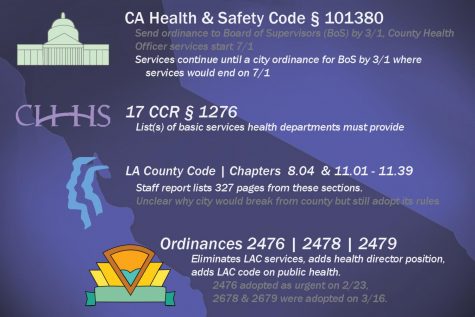
Davis and the county had cited the California Code of Regulations at the first town hall, and the city had cited the California Health and Safety Code during staff presentations.
Graphic by Joshua Sanchez/SAC.Media.
Budget Deputy Tami Omoto-Frias reaffirmed what Davis had said at the last town hall (without citing code) to reassure residents that nothing changes unless the city is recognized by the state.
Senior Deputy County Counsel Robert Ragland echoed similar sentiments and added that the county is against piecemealing out services.
“The county is not in favor of splitting services with the city because there would inevitably be jurisdictional issues between having a city health officer and a county health officer having jurisdiction over the same population,” Ragland said. “We’re fully supportive of the effort of West Covina if they want to create a model that is the same as Long Beach or Pasadena but that is a heavy undertaking.”
This undertaking is unneeded in Ragland’s opinion, but is ultimately the city’s decision.
“Our public health department doesn’t recommend cities create their own,” Ragland added. “We think we’re doing a great job for the entire county and it would be an unnecessary duplication of services.”
Other residents are worried about the local health department being unsuccessful due to financial concerns.
The county appears unwilling to separate out the city’s tax revenue from its general fund, which can lead to West Covina residents paying for the county’s health department despite not receiving services, due to how the county’s apportionment system works.
County Auditor-Controller Arlene Barrera also implied the county would reject the city proposed “tax transfer agreement” at the town hall, making increasingly difficult for the city to source funds for the project. The city had also overestimated the amount it wanted to tap by over $5 million from its initial over $10 million projection.
Other financial hurdles include financing a health director (among other positions) when the city is currently listed as the ninth worst in the state auditor’s dashboard for high risk cities in the state.
Aside from financial troubles, the city was close to becoming decertified as the local enforcement agency for the BKK Landfill back in Feb. 27, 2020 when CalRecycle sent the city a letter for failing to meet LEA requirements.
Based on the foregoing, CalRecycle has determined that proceeding with decertification of the LEA for the city is necessary for the protection of public health, safety and the environment.
The city took steps to address that, and the council voted 5-0 on Oct. 10, 2020 to avoid losing the status. Despite that corrective action, this letter shows the city as unable to upkeep one of its prior obligations, something the state would likely consider in its brand new process.
All of these issues make for a contentious public hearing on April 6, where residents will find out more about the city’s plans going forward.



